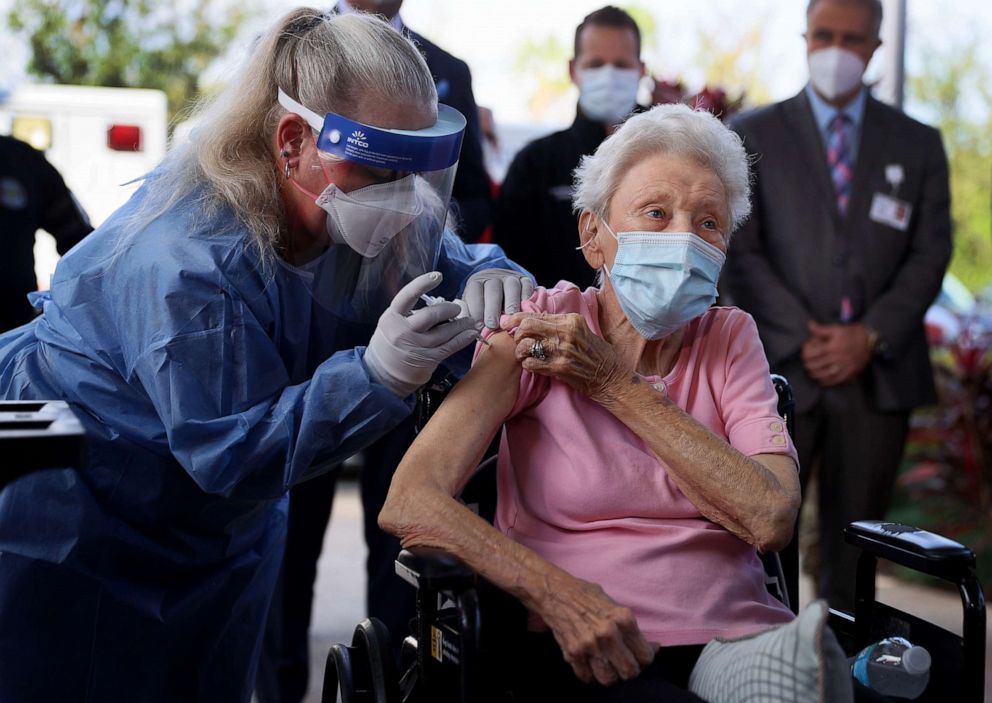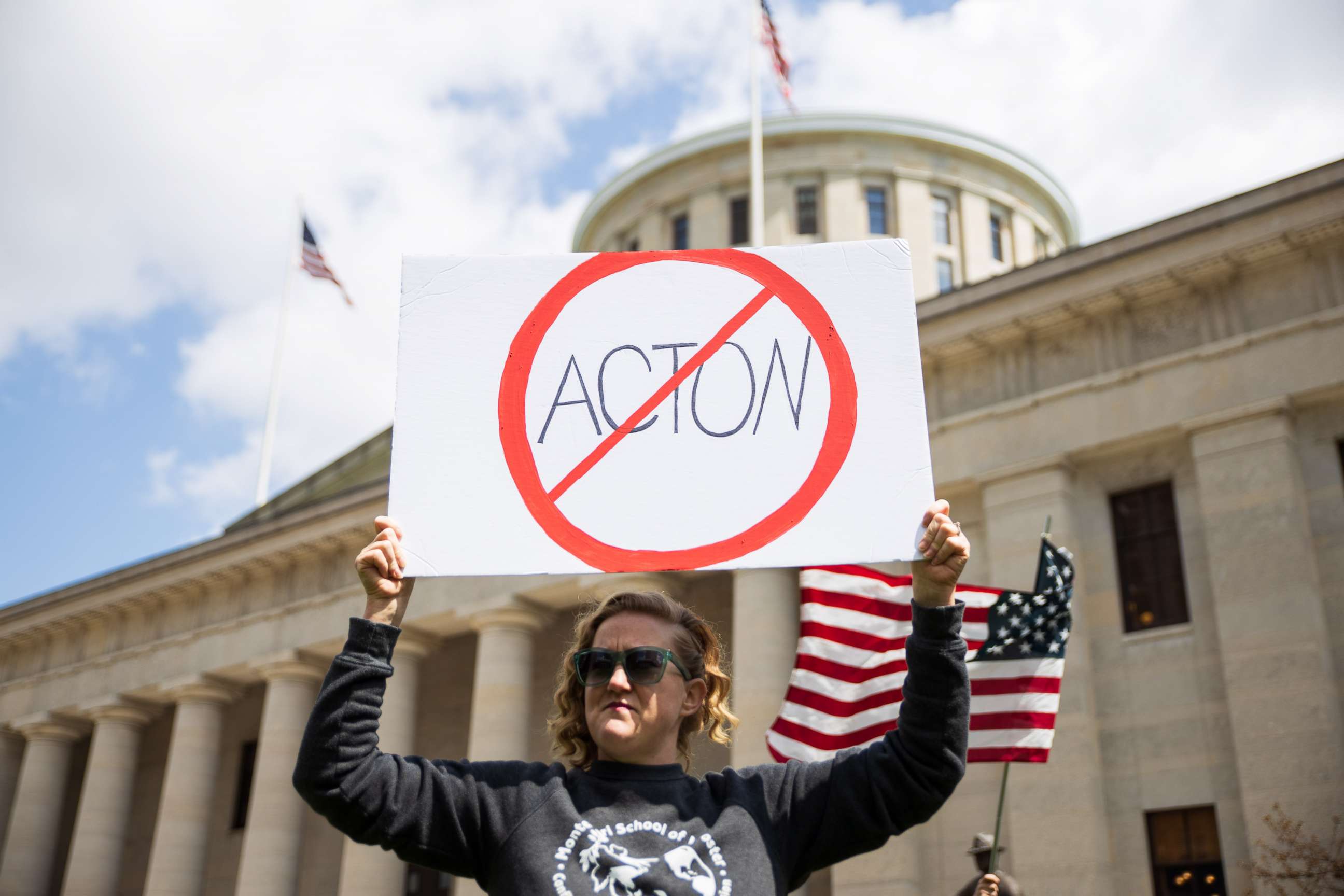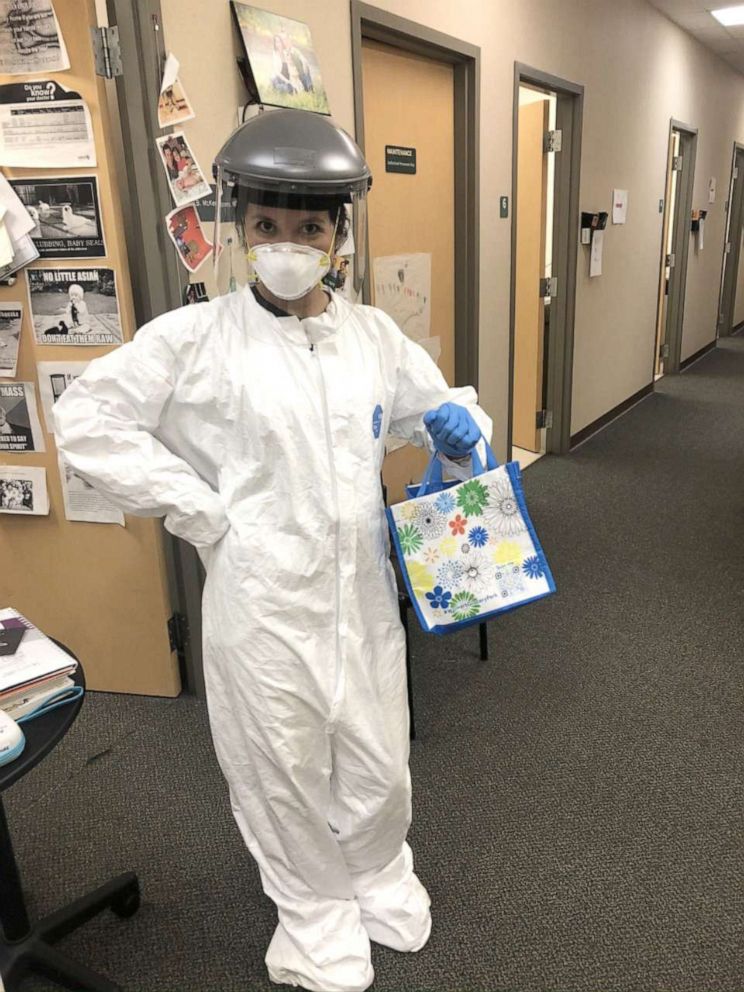Public health officials were stars -- and targets -- of pandemic response this year
There has been record turnover when experience is needed most, experts say.
In the early days of the pandemic, Dr. Jennifer Bacani McKenney would chat with residents of her Kansas hometown over the phone, on Facebook Messenger and at the grocery store about their COVID-19 concerns.
"We were just kind of accessible to everybody for all these unknowns," McKenney, a health officer in Fredonia, Wilson County, told ABC News.
Regular hour-long Facebook Live sessions soon followed. "People were just scared of the unknown, and they were thankful for us helping them walk through it all with them," she said.
The rural county didn't get its first COVID-19 case until almost mid-April, and by August had eight total reported. Throughout the fall, cases have picked up, with Wilson County now reporting over 600 cases as of Dec. 28.
As the county started implementing restrictions to reduce transmission, such as closing hair salons, "I could feel that's when things started turning," McKenney said.
"As the pandemic went on, you heard more loud and angry and frustrated voices that were more negative and just hurtful," said McKenney, who has been harassed in-person and online. "I know it's out of frustration and everything, but it still doesn't make it a lot easier, you know?"

McKenney's experience may be a familiar one to other public health officials in areas large and small, urban and rural, who have gone from largely unknown figures in their communities to the faces of the pandemic response.
That role has made them at turns beloved household names as well as targets amid the deeply political and divided response to the pandemic. Some of the reaction has been so extreme, health officials have been provided with security details.
On the national stage, figures like Dr. Anthony Fauci, the country's longtime leading infectious disease expert, have become famous, but also targets for criticism and death threats.
This pushback has been especially notable for women in high-profile positions, such as Ohio's former health director. Dr. Amy Acton stepped down from the post in June following protests at her home and challenges to her authority from the Republican state legislature.
Historic turnover
Turnover among health officials has been unprecedented, as dozens of local health leaders have quit, retired or been fired during the pandemic.
There have been 27 new heads of state health programs this year, according to the Association of State and Territorial Health Officers (ASTHO), a national nonprofit group that represents public health agencies in the U.S. and its territories. That type of turnover to the typically governor-appointed post is only normal in years where there's a new administration, ASTHO CEO Michael Fraser told ABC News.
"This isn't one of those years," Fraser said. "That was due to planned retirements, that was due to people being harassed and wanting to get out of the pressure cooker. It was due to political moves by governors. So lots of different reasons."
Some states have seen several turnovers at the top; North Dakota, for one, has had three top health officers resign during the pandemic, Fraser noted.
"That's the kind of churn that's not typical, but it certainly can be problematic, you know, in the middle of a pandemic," he said.
Lori Tremmel Freeman, CEO of the National Association of County and City Health Officials (NACCHO), has also been tracking the "ongoing exodus" among the organization's members during the pandemic.
Freeman first became alarmed when NACCHO lost three people on its 22-member board of directors in three weeks. By early December, she had tallied around 80 top-level officials nationwide leaving, though noted that is likely a severe undercount. An ongoing investigation by the Kaiser Health News and the Associated Press she pointed to has found that at least 181 public health leaders at both the state and local level in 38 states have either resigned, retired or been fired since April 1.
"We're getting into some really scary numbers here," Freeman told ABC News.
For her, local health officials have been put in "untenable positions" due to the climate of the COVID-19 pandemic, in which their authority has been undermined or questioned and they have become targets.
"They're really trying to make good on their promise to protect their communities no matter what, and especially during times of public health emergency, and in some cases, they're simply not able to do so because of the environment that they're working in," she said. "We just continue to see this happening across the country. Doesn't seem to make any difference where it is -- rural, suburban, urban. In red states, in blue states alike. It's a tough place to be."
Over two dozen county health officials in Kansas have left since the start of the pandemic, according to KCUR, a National Public Radio station in Kansas City, Missouri. Dr. Gianfranco Pezzino is one of the latest. The health officer in Shawnee County, Kansas, was set to step down at the end of the year, though he submitted his resignation effective immediately after the county commissioners voted on Dec. 14 to loosen some restrictions amid a surge in COVID-19 cases.
"It is clear from the events today, as well as the many instances in the past months when you repeatedly questioned and undermined my decisions and advice, that there are deep differences in ethics, values and strategies between this board and myself," Pezzino said during the commission meeting. "In full conscience, I cannot continue to serve as the health officer for a board that puts being able to patronize bars and sports venues in front of the health, lives and well-being of the majority of its constituents."
Following Pezzino's resignation during the meeting, Shawnee County Commissioner Aaron Mays said that "we have consistently supported his measures."
"We're not ignoring any kind of science," he said. "The spirit of the order is still intact. We made two very, very small modifications, in my opinion."
Challenges ahead
Public health officials have been key in COVID-19 testing and contact-tracing efforts throughout the pandemic. Now, they're helping in one of the most ambitious vaccination deployments in history. With two different vaccines recently authorized that both require two doses, being administered to various priority groups in limited quantities, the rollout is, to say the least, complicated. Unstable leadership and undermined health officials are causes for concern, experts said.

"We really are worried that those departing health officials and the gaps that they left behind, the relationships they have with others in the community, that could have an impact" on vaccine distribution, Freeman said.
Additionally, as health departments throughout the country are strained, there's "not a lot of slack in the system or resources to share" during this important time, Fraser said.
"Last year when we had the big measles outbreaks, folks were able to send staff from states that weren't impacted to help," he said. "You can't do that in this case because they have to stay home and do their own thing. So the surge that we normally depend on and some of the slack in the system is completely gone."
Funding is another area of concern. Nearly 70% of local health department's budgets either decreased or stayed the same in 2019 vs. 2018, according to NACCHO.
This year, public health departments are on "life support," Dr. Jeffrey Duchin, health officer for Seattle and King County, Washington, reportedly said during a Dec. 20 meeting of the Centers for Disease Control and Prevention's Advisory Committee on Immunization Practices.
"We have a long and difficult road ahead of us. There is a critical and immediate need for adequate funding," he reportedly said.
Future of the profession
The amount of stress, burnout and ultimate turnover among public health officials has both Freeman and Fraser concerned about the future of the field.
"We have seen recruitment taking a while," Fraser said, pointing to Ohio as one example. Acton's replacement, Dr. Joan Duwve, declined the job hours after Gov. Mike DeWine, a Republican, announced her appointment in September. Duwve told a South Carolina newspaper that she reconsidered the role in light of the harassment Acton endured.

"I don't think Ohio is unique," DeWine said during a press briefing at the time. "We've seen protests against governors. We've seen protests against health directors throughout this country. We know that these are issues that can be divisive."
A new state health director was named in November, as Ohio started reporting record COVID-19 cases.
For Freeman, the loss of experienced leadership is a concern because "there's not a bench waiting. And you don't have a lot of people raising their hands."
Among its efforts to support local health departments, NACCHO is working on a workforce bill that would create a loan repayment program for people who work in public health departments. Though that may not see any movement until after the pandemic, she said.
For now, many health officers are still committed to their posts. McKenney said she has had fleeting thoughts of quitting, but they're just that.

"This is my hometown, these are my people, even if everybody is not exactly unified or, at this point, all supportive," said McKenney, who, in addition to her part-time work as county health officer, runs a family medicine practice with her father and works at the regional hospital where she was born. She is also a member of her school board and the wife of the local mayor.
If McKenney sounds a little bit like her town's Leslie Knope -- the dedicated public servant on the TV show "Parks and Recreation" -- she's heard that a few times before.
"The people here are worth it. I wouldn't live here, I wouldn't work here, I wouldn't want to raise my kids here if it weren't for the people," she said. "It's not that I couldn't give up on the job; instead, I can't give up on the people. And I really just want to keep helping the people that I know and love."




